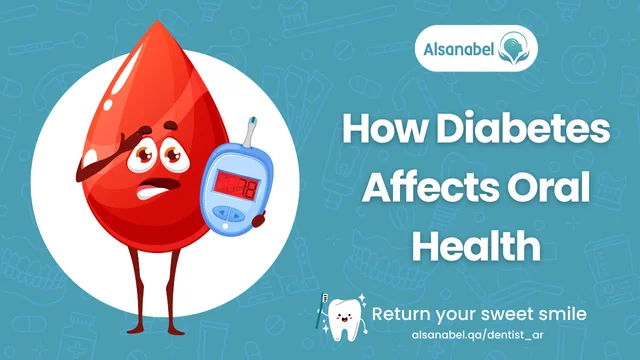
Maintaining good oral health is essential for everyone, but it becomes even more critical for individuals living with diabetes. Fluctuations in blood sugar and oral health are closely linked, making it necessary for diabetics to adopt a proactive approach to dental care. Uncontrolled diabetes can lead to a variety of dental issues, including gum disease, infections, and delayed healing after dental procedures.
Understanding the relationship between diabetes and oral health can help individuals manage their condition while protecting their teeth and gums. This article will explore the effects of diabetes on oral hygiene, prevention methods, and essential dental care tips for diabetics.
How Diabetes Affects Oral Health
Diabetes impacts nearly every system in the body, including the mouth. The connection between diabetes and oral care is primarily due to how high blood sugar levels weaken the body’s ability to fight infections. When blood sugar is not well controlled, it can lead to numerous oral complications.

1. Increased Risk of Gum Disease
- High blood sugar and oral health issues are closely linked because elevated glucose levels create an ideal environment for bacteria to thrive.
- Diabetics are more prone to gingivitis and periodontitis, conditions that cause inflammation, bleeding gums, and even tooth loss.
- Gum disease can also make it harder to control blood sugar levels, creating a dangerous cycle.
2. Dry Mouth and Reduced Saliva Production
- Saliva plays a vital role in washing away food particles and neutralizing acids in the mouth.
- Many diabetics experience diabetes dental effects such as dry mouth (xerostomia), which increases the risk of cavities, infections, and mouth sores.
3. Slow Healing After Dental Procedures
- Wounds in the mouth take longer to heal in people with diabetes due to impaired circulation and weakened immune response.
- Any dental surgery, including tooth extractions or implant placement, requires extra care to prevent infections.
4. Higher Risk of Oral Infections
- Oral thrush (candidiasis) is a common fungal infection in diabetics due to high sugar levels in saliva.
- This condition can cause painful white patches, redness, and difficulty swallowing.
Common Dental Issues in Diabetics
Individuals with diabetes are at higher risk of several oral health problems, making regular dental visits essential. Some of the most common issues include:
1. Periodontal Disease
- One of the most significant diabetes dental effects is severe gum disease, which can lead to tooth loss.
- Symptoms include swollen, bleeding gums, persistent bad breath, and gum recession.
2. Tooth Decay and Cavities
- Excess sugar in saliva creates an ideal environment for bacteria to produce acid, leading to decay.
- Diabetics who frequently snack on sugary foods or beverages are at an even higher risk.
3. Burning Mouth Syndrome
- Some diabetics experience a burning sensation in the mouth due to nerve damage or dry mouth.
- This condition can make eating and speaking uncomfortable.
4. Bad Breath (Halitosis)
- Poor blood sugar control can contribute to bad breath caused by bacterial buildup in the mouth.
- Regular brushing, flossing, and dental check-ups help reduce halitosis.
Preventing Dental Issues with Diabetes
Proper diabetes and oral care can significantly reduce the risk of dental problems and improve overall health. Here are some essential steps to follow:
1. Maintain Good Blood Sugar Control
- Keeping blood sugar levels within a healthy range minimizes diabetes dental effects like gum disease and infections.
- Work with a healthcare provider to adjust diet, medication, and lifestyle for better glucose regulation.
2. Follow a Strong Oral Hygiene Routine
- Brush at least twice daily with fluoride toothpaste.
- Floss daily to remove plaque buildup between teeth and along the gum line.
- Use an antibacterial mouthwash to reduce bacteria that cause gum disease.
3. Stay Hydrated and Combat Dry Mouth
- Drink plenty of water throughout the day to keep the mouth moist.
- Chewing sugar-free gum or using saliva substitutes can help alleviate dry mouth symptoms.
4. Avoid Smoking and Alcohol
- Smoking worsens gum disease and slows healing, making it even riskier for diabetics.
- Alcohol can dry out the mouth and contribute to decay.
5. Eat a Balanced Diet for Oral Health
- Focus on whole foods, including fiber-rich vegetables, lean proteins, and dairy products that support strong teeth.
- Limit sugary snacks and acidic beverages that promote tooth decay.
The Importance of Regular Dental Check-Ups for Diabetics
Diabetics should schedule routine dental visits to prevent complications and catch problems early.
How Often Should Diabetics Visit the Dentist?
- It is recommended that diabetics see a dentist at least twice a year for cleanings and check-ups.
- Those with existing gum disease may need more frequent visits.
What to Expect During a Dental Appointment
- A thorough examination of the teeth, gums, and oral tissues.
- Professional cleaning to remove plaque and tartar buildup.
- Discussion of any symptoms like bleeding gums, dry mouth, or bad breath.
- Recommendations for specialized treatments if needed.
Special Precautions for Diabetics Undergoing Dental Procedures
- Dentists may prescribe antibiotics before and after surgery to prevent infections.
- Blood sugar levels should be well-controlled before any invasive dental work.
- Healing times should be closely monitored to prevent complications.
Frequently Asked Questions

1. How Does Diabetes Affect Oral Health?
Diabetes weakens the immune system, making it harder for the body to fight infections. High blood sugar levels contribute to gum disease, dry mouth, tooth decay, and slow healing after dental procedures.
2. Can Diabetes Cause Gum Disease?
Yes, diabetics are at a higher risk of developing periodontal disease due to increased bacterial growth and inflammation in the gums. Poor blood sugar control worsens this condition.
3. What Are the Oral Symptoms of Diabetes?
Common oral symptoms include dry mouth, swollen or bleeding gums, persistent bad breath, slow wound healing, and an increased risk of oral infections like thrush.
4. How to Prevent Dental Issues with Diabetes?
To reduce the risk of dental problems, diabetics should maintain stable blood sugar levels, practice good oral hygiene, visit the dentist regularly, and avoid smoking or consuming excessive sugar.
5. How Often Should Diabetics Visit the Dentist?
Diabetics should schedule dental check-ups at least every six months, but more frequent visits may be necessary if there are signs of gum disease or other complications.
Conclusion
Managing diabetes and oral health requires a combination of blood sugar control, excellent dental hygiene, and regular professional care. Since diabetes dental effects can lead to severe complications if left untreated, diabetics must take proactive steps to protect their teeth and gums.
By prioritizing diabetes and oral care, individuals can prevent issues like gum disease, infections, and tooth loss. Scheduling regular dental visits, practicing daily oral hygiene, and making healthy lifestyle choices will help diabetics maintain a confident, healthy smile for years to come.
